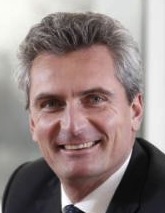Karsten Ottenberg, who played a key role in companies launching NFC technology the past 10 years, has resigned as CEO of Germany-based Giesecke & Devrient, a major smart card vendor and trusted service manager.
Ottenberg will head up the BSH Bosch und Siemens Hausgeräte, the third largest home appliance maker worldwide, with sales of €9.8 billion (US$13 billion) in 2012. He takes the position in October. It follows an eight-year stint as chief executive of G&D, considered as the No. 3 smart card vendor globally.
The G&D announcement today comes a day after another major smart card vendor, France-based Oberthur Technologies, ranked as the No. 2 smart card vendor worldwide, announced it would replace its CEO, Xavier Drilhon, with Didier Lamouche, former CEO of the moribund mobile phone chip joint venture between STMicroelectronics and Sweden’s Ericsson.
Lamouche had served as chief operating officer of Switzerland-based ST since 2010 before taking the job in December of 2011 heading the joint-venture, ST-Ericsson. By then, the venture, which was launched in 2009, was already suffering substantial losses, and Lamouche was brought in to reset strategy and stem the red ink. The company announced March 11 that he had resigned from the post, a week before ST and Ericsson said they would close down the joint venture.
Privately held Oberthur gave no official reason for the change, saying only that the company was on a “positive dynamic,” and that Drilhon had “contributed to the transition to a new shareholding structure.”
 Drilhon, a 19-year veteran of Oberthur, was appointed CEO in December 2011, after private equity firm Advent International bought Oberthur group’s card systems and identity divisions. These divisions had sales of €815 million in 2010, and Oberthur said it generated €880 million in sales in 2012. The company doesn’t release results.
Drilhon, a 19-year veteran of Oberthur, was appointed CEO in December 2011, after private equity firm Advent International bought Oberthur group’s card systems and identity divisions. These divisions had sales of €815 million in 2010, and Oberthur said it generated €880 million in sales in 2012. The company doesn’t release results.
The departure of Ottenberg, 51, comes as G&D has been struggling in its smart card business segment, one of the company’s two pillars with banknote printing.
G&D earlier this month announced a restructuring plan to cut 400 jobs in Europe, including 125 positions at its headquarters in Munich. G&D in its announcement today of Ottenberg’s departure made a point of saying he left “on his own accord” to join BSH. The company said it would announce a successor “in due course.”
Family-owned G&D has seen profits fall over at least the past four straight years. In figures released earlier this month, the company said net income decreased in 2012 to €39 million (US$51.5 million), down from €53.1 million in 2011 and €111 million in 2008. Revenue in its main smart card unit, mobile security, increased by 5% in 2012 to €687 million, after falling sharply in 2011. But G&D's banknote business, its largest segment, grew by 16% last year to €902 million. A smaller government ID unit grew by only 2% to €201 million.
The job cuts are coming to G&D's mobile security division, which also includes its TSM unit, but a spokesman earlier this month told NFC Times the company has no plans to cut investment or jobs in the TSM or NFC business, where he said G&D remains “well-positioned.”
G&D seemed to blame the problems the past year or two mainly on falling prices for SIM and banking cards, but the company has appeared to come up short in competition with such rivals as France-based Gemalto, which like G&D, Oberthur and other smart card vendors are trying to balance their increasingly commoditized card businesses with more service-based revenue.
Among other initiatives, that includes promoting its trusted service management business, and G&D under Ottenberg was among the first to enter the TSM market. It joined with Nokia, then the largest handset maker, in announcing in mid-2006 an intention to form a joint venture to launch a trusted service management company. The company, later named Venyon, offered over-the-air downloads and management of applications for both mobile operators and service providers.
 The partners believed that by 2008 they would be doing a roaring business in TSM, but that didn’t happen, and Nokia officially exited the venture in December 2009, allowing G&D to buy out its 43% stake in Venyon. G&D is believed to be struggling in its TSM business, despite notching such high-profile contracts as the groupwide TSM business for Spain-based Telefónica group.
The partners believed that by 2008 they would be doing a roaring business in TSM, but that didn’t happen, and Nokia officially exited the venture in December 2009, allowing G&D to buy out its 43% stake in Venyon. G&D is believed to be struggling in its TSM business, despite notching such high-profile contracts as the groupwide TSM business for Spain-based Telefónica group.
Before joining G&D, Ottenberg worked 18 years at Philips Electronics group, serving as general manager of the smart card chip business for Philips Semiconductors, now NXP, from 1999 to 2002. In that role, he played an important part in the creation of NFC technology, which the Netherlands-based chip maker launched in September of 2002 with Japan-based Sony Corp.
Besides facing tough competition from French smart card and TSM suppliers, G&D stumbled in its effort to gain an early foothold in what it considered a promising market for secure microSD cards. That market has yet to materialize.
G&D formed a joint venture and Taiwan-based flash memory chip supplier Phison Electronics, Giesecke & Devrient Secure Flash Solutions, in October of 2009, together investing an estimated €3 million (US$4.5 million). G&D owned a reported 70% of the company, while Phison held the remainder. Phison in 2009 confirmed it had invested €900,000 for its 30% stake, which would indicate G&D put up €2.1 million in initial funding.
The parties dissolved the venture at the end of 2012.

